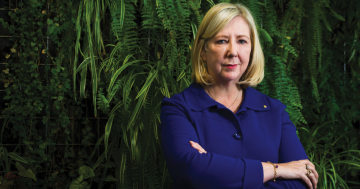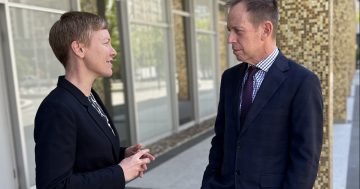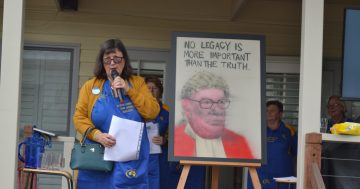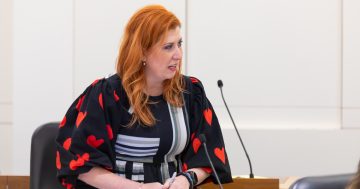
A man listens to the National Apology from outside Parliament House. Photo: George Tsotsos
The ACT Victims of Crime Commissioner is calling for the Government to implement the use of intermediaries in the criminal justice as soon as possible to ensure the voices of vulnerable victims are better heard by police and the courts in sexual offence matters.
She spoke to Region Media minutes before Prime Minister Scott Morrison delivered the National Apology to victims of child sexual abuse at Parliament House.
The Royal Commission into Institutional Responses to Child Sexual Abuse recommended the use of intermediaries and ACT Attorney-General Gordon Ramsay has accepted the recommendation in principle but is still to commit to a timetable for their introduction.
Commissioner Heidi Yates said pilot programs had been in place in New South Wales for two and a half years and since July in Victoria and involved intermediaries becoming involved where children and young people are first reporting to police about being sexually abused, and then in the giving of evidence and cross-examination if it proceeded to prosecution.
Intermediaries are independent officers of the court who are communications experts trained in areas such as speech pathology, occupational therapy and psychology, and who can advise police how to assess, approach and interview victims to elicit accurate evidence.
Ms Yates said that in the example of a girl with cerebral palsy, police couldn’t understand enough of what was being communicated to charge her carer with abuse.
Intermediaries can also help set the ground rules for a trial if a case goes to court, establishing the communication needs of the witness, the way questions would best be asked and eliminating complex language so they can comprehend and respond.
An intermediary can also intervene on behalf of the witness if they do not understand a question, and advise on how a question could be better put.
Ms Yates said the NSW and Victorian Bar had adapted to the process very quickly, with one barrister telling a meeting at the Legislative Assembly last week that it had been surprisingly productive and a real resource.
Pilots had focused on sexual abuse matters but police and prosecution offices were calling for intermediaries to be used on other matters.
“I would like to see us roll out a scheme that makes intermediaries available in a broader range of matters, and also be available for vulnerable accused,” Ms Yates said.
Mr Ramsay said the Government would keep working to deliver an intermediaries scheme as part of a comprehensive response to the Royal Commission. “The timing, scope, and mechanics of the scheme will be worked out as part of this ongoing process,” he said.
Ms Yate’s office will be responsible for delivering counselling and ongoing psychological support under the National Redress Scheme and also working with the Government on the implementation of many of the Royal Commission’s recommendations.
“The National Apology is groundbreaking both for Canberrans and their families who live every day in a practical way with the horrific and lifelong impacts of childhood sexual abuse,” Ms Yates said.
“But action can’t and won’t stop with an apology and the National Redress Scheme does provide survivors with an opportunity to seek a financial recognition payment, the option of also seeking a direct personal response, basically an apology from the responsible institution, and to also access ongoing counselling and psychological support.”
The ACT Human Rights Commission has offered its support to victims and survivors of institutional child sexual abuse, with President Helen Watchirs commending the Federal Government for its apology made today.
“We acknowledge the pain, suffering and distress of victims and survivors, and commend those who testified before the Royal Commission. Their testimonies allow us as a nation to acknowledge past abuses, and remind us of the work we must continue to do to minimise risk to children and young people in the ACT,” Dr Watchirs said.
Children and Young People Commissioner, Jodie Griffiths-Cook said all children and young people should feel safe within our community.
“Although ensuring the safety and well-being of ACT children and young people is a whole-of-community responsibility, adopting child-safe standards, particularly by ensuring the views of children and young people are taken seriously, will strengthen organisations and support the ACT’s commitment to a child safe, child-friendly Canberra,” Ms Griffiths-Cook said.
Both Ms Yates and Ms Griffiths-Cook are members of the ACT Royal Commission Working Group and continue to provide input into the ACT’s responses to the Royal Commission’s recommendations.
Community members needing support can contact the Human Rights Commission on 1800 822 272.




















